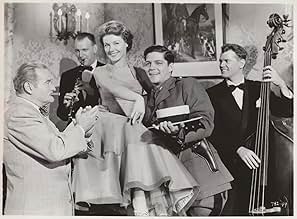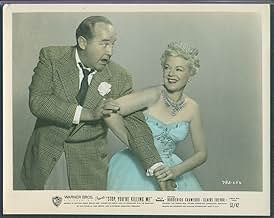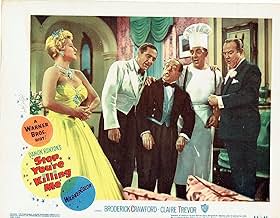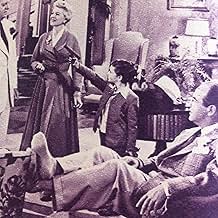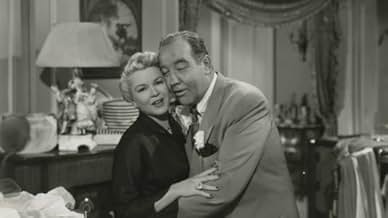IMDb RATING
6.1/10
358
YOUR RATING
After the repeal of Prohibition, a beer-maker decides to sell beer legally, but no one wants to buy his revolting beer, and he does not want to force sales.After the repeal of Prohibition, a beer-maker decides to sell beer legally, but no one wants to buy his revolting beer, and he does not want to force sales.After the repeal of Prohibition, a beer-maker decides to sell beer legally, but no one wants to buy his revolting beer, and he does not want to force sales.
- Director
- Writers
- Stars
Harry Morgan
- Innocence
- (as Henry Morgan)
Eddie Acuff
- Cab Driver
- (uncredited)
Bill Alcorn
- Party Guest
- (uncredited)
Phil Arnold
- Little Dutch
- (uncredited)
Larry J. Blake
- Police Captain
- (uncredited)
- Director
- Writers
- All cast & crew
- Production, box office & more at IMDbPro
Featured reviews
In this remake of A Slight Case Of Murder, Broderick Crawford steps into the shoes of Edward G. Robinson in a remake of the film that had its origins as a Broadway play written by Damon Runyon. It was a flop play on Broadway in the Thirties but a roaring success as a film.
Both Crawford and Robinson in the leads of their respective films got a chance to burlesque the tough guy images both so carefully cultivated. Both looked like they were enjoying themselves on screen.
The film concerns the end of Prohibition and a gangster who made it big in the illegal beer racket now wants to go legitimate and gain some respectability. Crawford and his wife Claire Trevor rent a big country mansion near the Saratoga racetrack and throw a huge party. They want respectability not just for themselves but for daughter Virginia Gibson who is engaged into some upper crust WASP family.
But a robbery of bookies at Saratoga (remember this is set in the 30s before pari-mutual machines so the tracks had bookies to take bets) and the crooks using this 'abandoned' mansion as a hideout interrupt all those plans. Without revealing more all the legal and domestic and financial problems all get nicely resolved as the film concludes in a very funny way.
Other than some really unnecessary musical numbers the film is practically a carbon copy of the original. Stop, You're Killing Me is highly recommended as tonic for the funny bone.
Both Crawford and Robinson in the leads of their respective films got a chance to burlesque the tough guy images both so carefully cultivated. Both looked like they were enjoying themselves on screen.
The film concerns the end of Prohibition and a gangster who made it big in the illegal beer racket now wants to go legitimate and gain some respectability. Crawford and his wife Claire Trevor rent a big country mansion near the Saratoga racetrack and throw a huge party. They want respectability not just for themselves but for daughter Virginia Gibson who is engaged into some upper crust WASP family.
But a robbery of bookies at Saratoga (remember this is set in the 30s before pari-mutual machines so the tracks had bookies to take bets) and the crooks using this 'abandoned' mansion as a hideout interrupt all those plans. Without revealing more all the legal and domestic and financial problems all get nicely resolved as the film concludes in a very funny way.
Other than some really unnecessary musical numbers the film is practically a carbon copy of the original. Stop, You're Killing Me is highly recommended as tonic for the funny bone.
After the ban was lifted, a brewer decides to sell the beer legally, but no one wants to buy his rebellious beer, and he doesn't want to force sales. Sorry,
I dislike remakes, and Hollywood has made a ton of them over the years. In the few cases where I actually liked the remakes, most of the time it was because the original film was flawed and the remake managed to work out the kinks--resulting in a better film. However, in the case of "A Slight Case of Murder", this is a very, very tall order, as this is one of the better comedies of the 1930s and one of Edward G. Robinson's best films. Because of this, I just understand why they didn't just re-release the original and remake some other film instead.
In "Stop, You're Killing Me", the film was originally seen as a remake featuring the singing and comedy of Danny Kaye. This might have worked. However, when Kaye was unavailable, they substituted Broderick Crawford--a man about as unlike Kaye as you could imagine! Hearing Crawford sing was sure interesting! Fortunately, it was quite brief and the rest of the music for the Kaye version was dropped or sung by others!
The film begins the day Prohibition ends. The good times for Marco (Crawford) and his gang of bootleggers is over--as cheaper and MUCH better booze is now available everywhere. So, Marco decides to disband the gang and retire. After a time, he gets bored and decides to re-open his brewery--legitimately this time. The problem is, his beer totally sucks and the only reason folks bought it was because his gang forced them to buy it and better stuff wasn't available. Marco is in trouble--and about to walk into more when he takes a little vacation.
There's been a huge holdup and an unrelated gang is hanging out in the mansion where Marco and his pals are headed for their vacation. To make things worse, one of the gang members ends up killing his partners and hides their bodies all over the place. Add to this a precocious and very annoying kid and you have a recipe for fun...or at least that's the way it was in the original!
The problem with "Stop, You're Killing Me" is that aside from a tiny bit of music and color, the film is just too close to the original and offers nothing new. The only major plus was Margaret Dumont--she was great! Plus, while everyone tries their best, I just couldn't help but think how much more I liked the originals--with not only Robinson but Allen Jenkins, George E. Stone, Eddie Brophy and more! Still, the original script was quite good and even though the film never should have been made, it was still pleasant and entertaining.
In "Stop, You're Killing Me", the film was originally seen as a remake featuring the singing and comedy of Danny Kaye. This might have worked. However, when Kaye was unavailable, they substituted Broderick Crawford--a man about as unlike Kaye as you could imagine! Hearing Crawford sing was sure interesting! Fortunately, it was quite brief and the rest of the music for the Kaye version was dropped or sung by others!
The film begins the day Prohibition ends. The good times for Marco (Crawford) and his gang of bootleggers is over--as cheaper and MUCH better booze is now available everywhere. So, Marco decides to disband the gang and retire. After a time, he gets bored and decides to re-open his brewery--legitimately this time. The problem is, his beer totally sucks and the only reason folks bought it was because his gang forced them to buy it and better stuff wasn't available. Marco is in trouble--and about to walk into more when he takes a little vacation.
There's been a huge holdup and an unrelated gang is hanging out in the mansion where Marco and his pals are headed for their vacation. To make things worse, one of the gang members ends up killing his partners and hides their bodies all over the place. Add to this a precocious and very annoying kid and you have a recipe for fun...or at least that's the way it was in the original!
The problem with "Stop, You're Killing Me" is that aside from a tiny bit of music and color, the film is just too close to the original and offers nothing new. The only major plus was Margaret Dumont--she was great! Plus, while everyone tries their best, I just couldn't help but think how much more I liked the originals--with not only Robinson but Allen Jenkins, George E. Stone, Eddie Brophy and more! Still, the original script was quite good and even though the film never should have been made, it was still pleasant and entertaining.
Broderick Crawford and Claire Trevor shine in this semi-musical remake of A Slight Case Of Murder, now called Stop, You're Killing Me! Guys and Dolls it ain't, but it's Damon Runyon heart is in the right place. This tale of a beer baron whose wife and daughter are trying to crash high society, and who seem well on their way but for a little problem of a bunch of corpses in their Lake George mansion, is a nice mix of Arsenic and Old Lace-style gallows whimsy and Capone era gangster melodrama. If one has an appetite for either, and especially both, you will be richly rewarded by this one.
Daffy bit of nonsense that benefits from the perfectly matched leads. Big, brawling, braying Broderick Crawford and the divine Claire Trevor at her brassy, sassy height. As a hood and his wife/moll longing to go straight and enter high society for the sake of their daughter the pair tear it up, Broderick with his over the top performance, which is just right for the material and Claire's more shaded but equally well measured work.
Joining them in the fun are several distinguished character actors, Ned Glass, Sheldon Leonard, Harry Morgan, Margaret Dupont etc., all doing some variant of their patented shtick and adding to the jolly nature of this black comedy.
The only place where this fall short is in the casting of the secondary leads. Neither Bill Hayes, who went on to decades of fame on the daytime soap Days of Our Lives, nor Virginia Gibson make much of an impression against the colorful juggernaut and polished scene stealing of the stars.
Joining them in the fun are several distinguished character actors, Ned Glass, Sheldon Leonard, Harry Morgan, Margaret Dupont etc., all doing some variant of their patented shtick and adding to the jolly nature of this black comedy.
The only place where this fall short is in the casting of the secondary leads. Neither Bill Hayes, who went on to decades of fame on the daytime soap Days of Our Lives, nor Virginia Gibson make much of an impression against the colorful juggernaut and polished scene stealing of the stars.
Did you know
- TriviaThe film was originally designed as a vehicle for Danny Kaye, then under contract to Warner Brothers, but the comedian terminated his agreement with the studio.
- GoofsRepeal of Prohibition was December 5, 1933, but in the opening scene set that day in Manhattan, most people are wearing warm-weather clothing. In addition, on the marquee of the Loew's State Theatre is the title of the film Crépuscule (1941) and on the marquee of the Criterion Theatre is Manhattan Merry-Go-Round (1937).
- ConnectionsReferences Manhattan Merry-Go-Round (1937)
- SoundtracksStop, You're Killing Me
(uncredited)
Music by Carl Sigman
Lyrics by Bob Hilliard
Sung by an off-screen chorus during the opening credits
Details
- Runtime1 hour 26 minutes
- Aspect ratio
- 1.37 : 1
Contribute to this page
Suggest an edit or add missing content

Top Gap
By what name was Le bal des mauvais garçons (1952) officially released in India in English?
Answer
